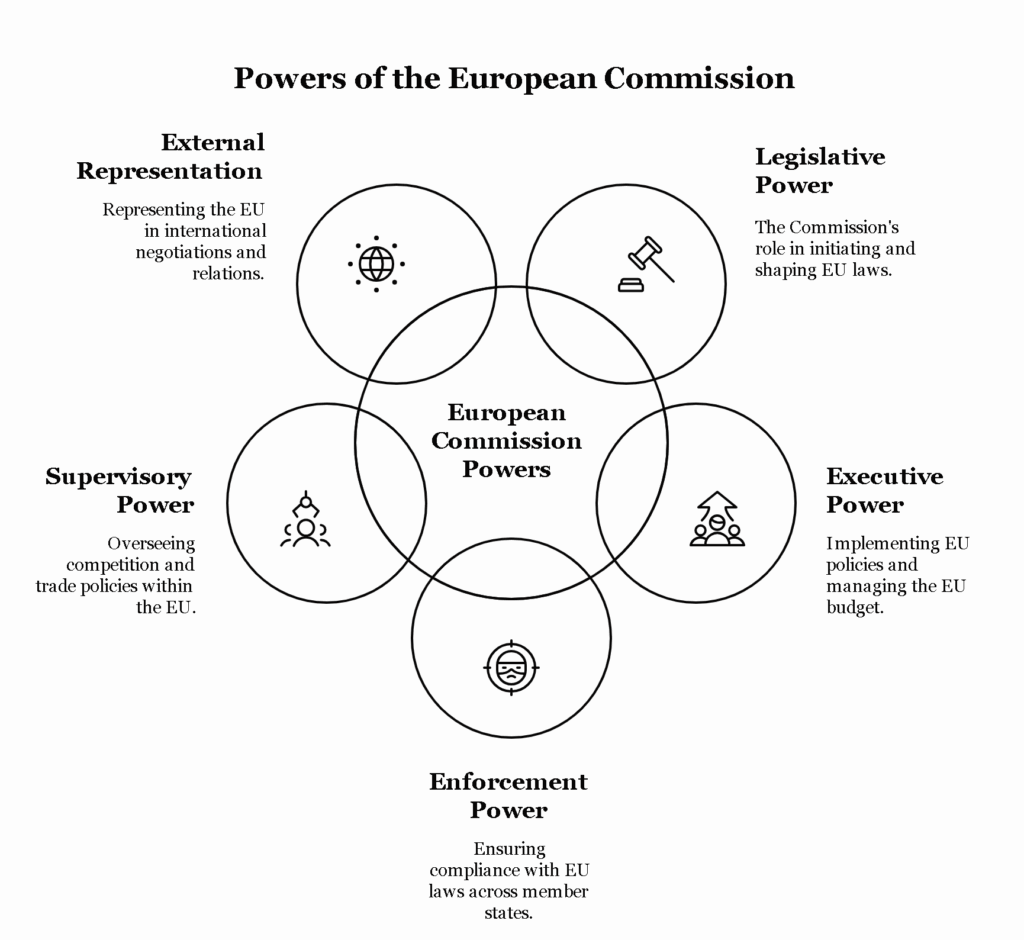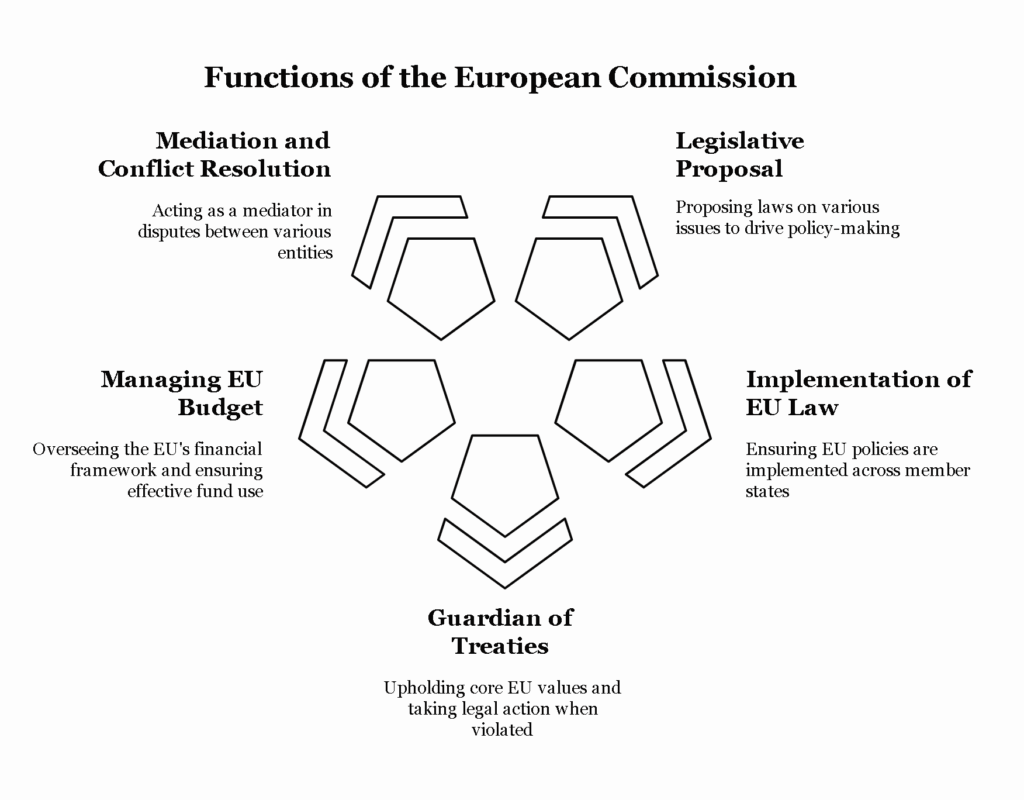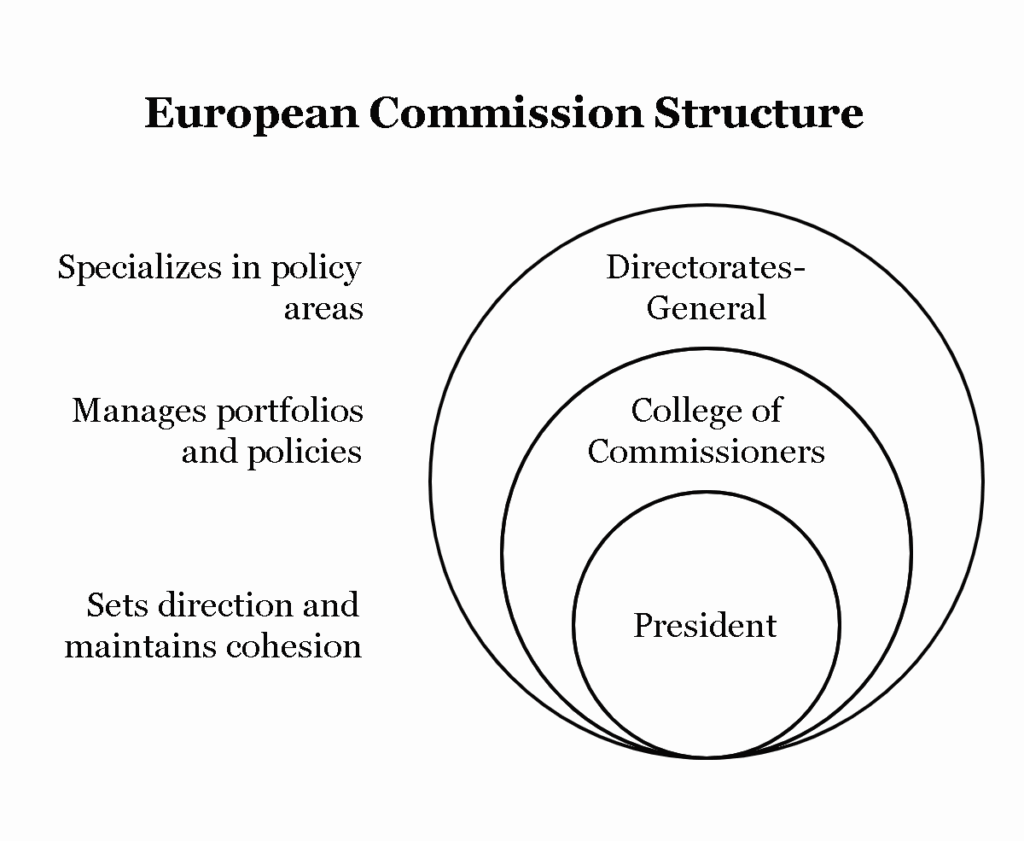The European Commission is one of the central pillars of the European Union (EU) and plays a critical role in the Union’s institutional framework. As the executive arm of the EU, the Commission is tasked with implementing policies, ensuring compliance with EU laws, and representing the EU’s interests both internally and externally. The Commission’s powers and functions are diverse, making it one of the most influential bodies in the EU system.
1. Powers of the European Commission
The European Commission’s powers are granted by the EU Treaties, particularly the Treaty on the Functioning of the European Union (TFEU). These powers can be broadly categorized into legislative, executive, enforcement, and representative powers.
- Initiating Legislation (Legislative Power):
The Commission holds the exclusive right to propose new EU laws, making it the main legislative initiator. It drafts and presents legislative proposals to the European Parliament and the Council of the EU, which must approve or amend these proposals. While the Parliament and Council have significant roles in shaping and passing laws, the Commission’s power to initiate legislation gives it considerable influence over the legislative agenda. In addition, the Commission ensures that its proposals reflect the priorities of the Union, often guided by consultations with national governments, stakeholders, and civil society. - Executive Power:
As the EU’s executive body, the Commission implements the policies and decisions of the EU once they have been adopted. This includes managing the EU budget, overseeing the distribution of funds, and ensuring that EU laws are applied across member states. The Commission is also responsible for overseeing the implementation of EU laws through its various Directorates-General (DGs), which are departments focused on specific policy areas, such as trade, competition, agriculture, environment, and digital affairs. - Enforcement Power:
The Commission plays a crucial role in monitoring the compliance of EU member states with EU laws. If a member state fails to implement or violates EU law, the Commission can initiate infringement procedures. These procedures begin with a formal letter of notice to the member state in question, followed by a reasoned opinion if the issue is not resolved. If the issue remains unresolved, the Commission may refer the case to the Court of Justice of the European Union (CJEU) for a ruling. This ensures that EU laws are uniformly applied across all member states, thereby upholding the integrity of the Union’s legal framework. - Supervisory Power:
The Commission oversees several key areas of EU governance, such as ensuring competition law is adhered to within the single market. This includes investigating anti-competitive practices, mergers, and state aid that may distort competition within the EU. It also supervises trade policy, ensuring that international agreements, such as trade agreements negotiated by the EU, are correctly implemented and enforced. - External Representation:
The Commission represents the EU in external matters, particularly in international negotiations and dealings with non-EU countries and organizations. The Commission negotiates trade agreements, cooperates with international organizations such as the World Trade Organization (WTO), and contributes to foreign policy decisions, especially in sectors where the EU holds exclusive competences. It is responsible for managing EU relations with countries and regions around the world in areas like development cooperation, humanitarian aid, and environmental protection.

2. Functions of the European Commission
The European Commission’s functions extend beyond its legal and executive powers. It is also a key player in shaping the future direction of the European Union and ensuring its proper functioning in several critical areas.
- Legislative Proposal and Agenda-Setting:
The Commission’s most significant function is its ability to set the legislative agenda. By proposing laws on a range of issues—ranging from environmental protection, energy policy, consumer protection, competition policy, and digital regulation—the Commission drives the policy-making process. The importance of this function is amplified by the European Parliament’s increased powers, which require the Commission to carefully craft proposals that can garner support from both the Parliament and the Council. - Implementation of EU Law and Policies:
The Commission is responsible for ensuring that EU policies are implemented across all member states. This includes both regulatory measures and operational programs. For example, it oversees the implementation of the Cohesion Fund and European Structural Funds, ensuring that funds are distributed to reduce regional disparities and promote economic development in less-developed regions of the EU. - Guardian of the Treaties:
As the guardian of the EU’s founding treaties, the Commission plays a pivotal role in ensuring that the core values of the EU—democracy, rule of law, respect for human rights, and fundamental freedoms—are respected by all member states. This includes monitoring issues like fundamental rights, democratic standards, and judicial independence. In situations where member states violate these principles, the Commission can take legal action, as mentioned earlier. - Managing the EU Budget:
The Commission oversees the EU’s multiannual financial framework (the EU budget), which allocates funding to various policy areas such as agriculture, research, infrastructure, and foreign aid. The Commission manages the disbursement of EU funds and ensures that they are used effectively and in line with EU regulations. - Mediation and Conflict Resolution:
Another key function of the Commission is acting as a mediator in disputes between EU institutions, member states, or between private actors and public authorities. Through its regulatory powers, the Commission can propose solutions to conflicts related to trade barriers, state aid, and regulatory standards.

3. Organizational Structure and Composition
The European Commission is composed of a President and 28 Commissioners (one per member state), although this number has reduced to 27 following Brexit. The President sets the strategic direction and agenda of the Commission and is responsible for maintaining internal cohesion. Each Commissioner is assigned a specific portfolio, and together they form the College of Commissioners. The President and Vice Presidents are particularly influential, with the President acting as the head of the EU’s executive branch.
The Commission operates through its Directorates-General (DGs), which are specialized units dedicated to specific policy areas (e.g., DG Trade, DG Environment, DG Competition).

Conclusion:
The European Commission plays an essential role in the functioning of the European Union. Its broad powers span legislative initiation, policy implementation, enforcement of EU law, and external representation. As the driving force behind the EU’s economic, social, and environmental policies, the Commission is at the heart of EU governance. By shaping legislative agendas, ensuring compliance with EU laws, and acting as the Union’s representative on the global stage, the Commission has a profound influence on both the internal workings of the EU and its interactions with the wider world.








Leave a Reply